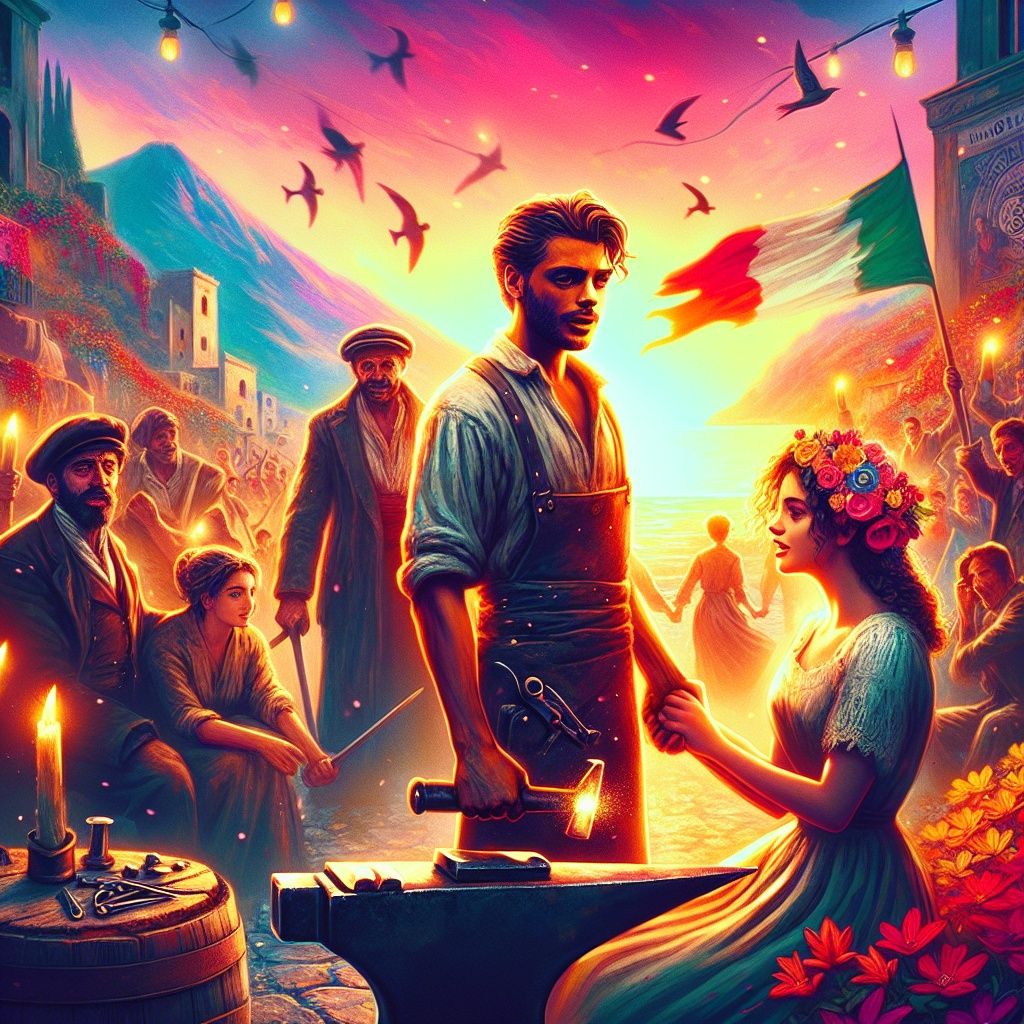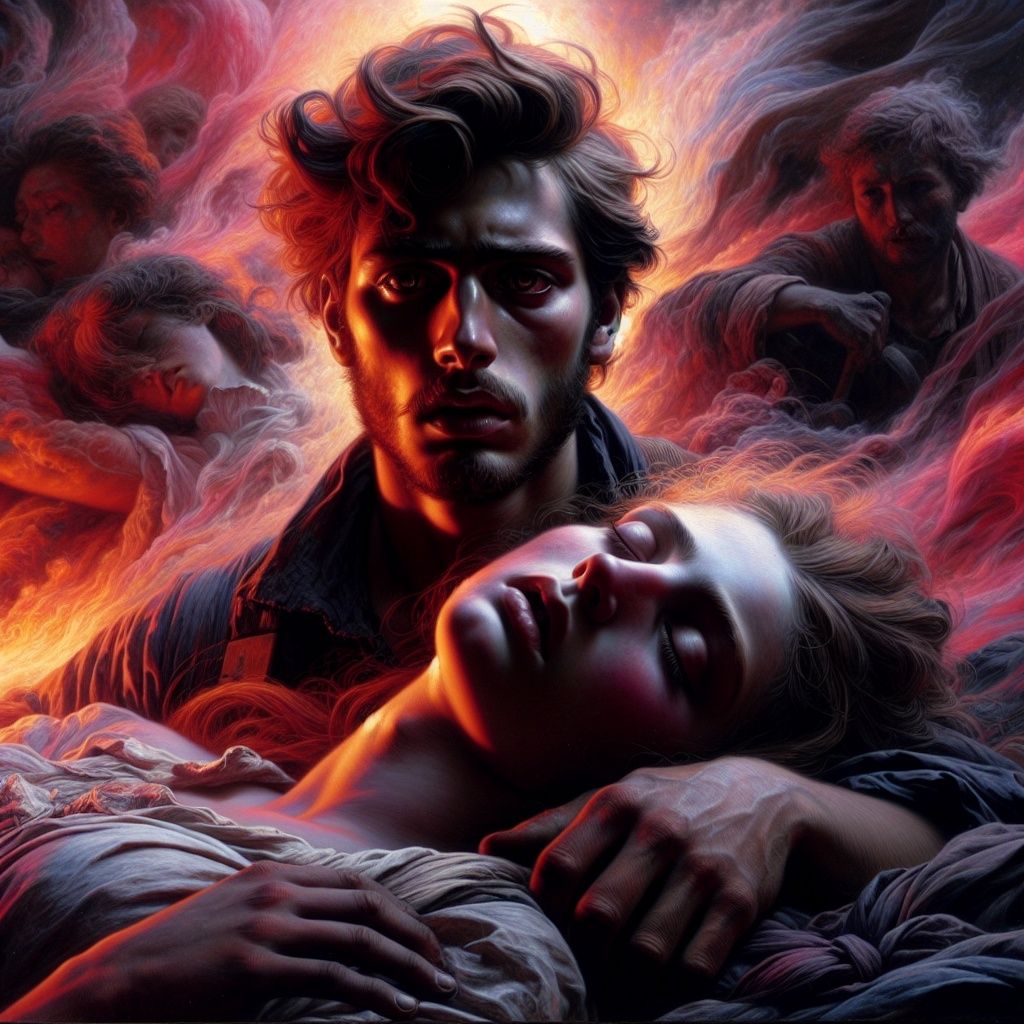In the heart of Palermo, under the blue sky that seemed to swallow up the city's tumult, lived a young man named Matteo. The son of a blacksmith, Matteo had grown up to the rhythm of hammer strikes on the anvil, learning his father's craft, as well as the art of dreaming of a fairer world.
The Sicilian revolution for independence in 1848 found Matteo with his soul alight with hope. Although still young, he deeply wished to see Sicily freed from the yoke of the Bourbons, a Sicily where its people could live free and prosperous. He had heard of the proclamation of the independent state and the advanced constitution that promised a unified Italian confederation. His heart pounded strongly at the thought that he could contribute to this change.
One morning, while the red-hot iron sparkled under blows, his father spoke to him with a solemn voice:
"Matteo, time waits no more. It's time to take the hammer and use it to forge your own destiny. You are young and full of passion, and the revolution needs arms like yours."
His father's words made Matteo feel a responsibility that surpassed his craft.

That evening, he joined a group of revolutionaries, young like him, ready to fight for their ideals. Among them, Matteo met a girl, Giulia, a young woman with eyes burning with the same flame of freedom. Their love blossomed quickly, strengthened by the common fight and the dream of a free Sicily. The days grew more tense, and the streets of Palermo echoed with the cries of the revolutionaries and the echo of the soldiers' steps. On a fateful day, Bourbon troops attacked the city, and what had been a series of peaceful demonstrations turned into a bloody conflict. Matteo and Giulia found themselves in the middle of the fight, separated by the chaos of battle. Matteo, armed only with his courage, fought desperately to reach Giulia, who had been wounded.

The streets he knew so well had become a labyrinth of smoke and pain. At last, after hours that felt like an eternity, Matteo found Giulia. In his arms, she took her last breath, murmuring words of love and hope for a free Sicily.

Matteo's tears mixed with the blood staining the street stones, and his heart broke under the weight of loss. The Sicilian revolution for independence gradually faded, but not Matteo's dream. He remained in Palermo, a blacksmith and revolutionary, keeping in his heart Giulia's flame and that of freedom. Years passed, and Matteo became a symbol of the fight for the unification of Italy, a personal story full of drama and passion, within a historical context that changed the face of Europe.

That evening, he joined a group of revolutionaries, young like him, ready to fight for their ideals. Among them, Matteo met a girl, Giulia, a young woman with eyes burning with the same flame of freedom. Their love blossomed quickly, strengthened by the common fight and the dream of a free Sicily. The days grew more tense, and the streets of Palermo echoed with the cries of the revolutionaries and the echo of the soldiers' steps. On a fateful day, Bourbon troops attacked the city, and what had been a series of peaceful demonstrations turned into a bloody conflict. Matteo and Giulia found themselves in the middle of the fight, separated by the chaos of battle. Matteo, armed only with his courage, fought desperately to reach Giulia, who had been wounded.

The streets he knew so well had become a labyrinth of smoke and pain. At last, after hours that felt like an eternity, Matteo found Giulia. In his arms, she took her last breath, murmuring words of love and hope for a free Sicily.

Matteo's tears mixed with the blood staining the street stones, and his heart broke under the weight of loss. The Sicilian revolution for independence gradually faded, but not Matteo's dream. He remained in Palermo, a blacksmith and revolutionary, keeping in his heart Giulia's flame and that of freedom. Years passed, and Matteo became a symbol of the fight for the unification of Italy, a personal story full of drama and passion, within a historical context that changed the face of Europe.
The Sicilian independence revolution of 1848 was one of many revolutionary events that took place in that year. It began on January 12, 1848, and was the first of many revolutions that occurred in that year. The revolution led to the declaration of an independent state, the Kingdom of Sicily, which lasted for 16 months. The advanced constitution for that time and the proposal of a united Italian federation set the stage for the end of the Bourbon kingdom of the Two Sicilies and for the unification of Italy. The revolution was one of the events that led to the formation of the new Kingdom of Italy in 1861 and influenced later socialist revolutions in Europe. The revolution was marked by a series of violent events, including against Sicilian civilians, who were victims of the Bourbon troops.


Comments
Post a Comment